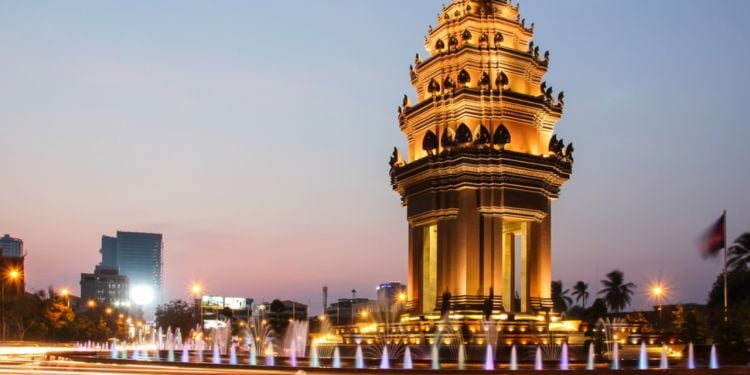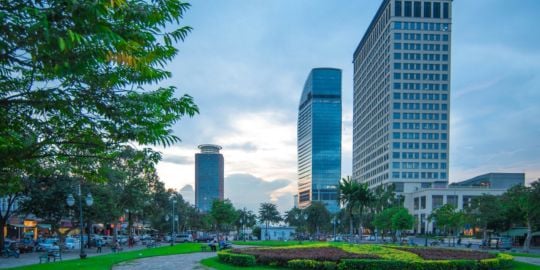Work in Cambodia

Opportunities are aplenty for foreigners who fall in love with Cambodia after visiting this magical kingdom, or who've heard tales and dream of experiencing its vibrant culture. Whether you're a bartender or a financial adviser, you're highly likely to find something that fits your needs, your experience and your qualifications.
Many jobs for professionals are organised in advance, as the amount of foreigners working in an enterprise in Cambodia cannot exceed 10% of the overall staff. This quota of international employees is supposed to comprise of 6% skilled workers, 3% office workers and 1% non-skilled workers. However, although laws are now in place to encourage the recruitment of Cambodian staff, the Ministry of Labour generally allows over 10% of a company's employees to come from overseas, so long as valid reasons are given for why a Cambodian cannot do a specific job. Companies are required to submit a request between September and November each year if they wish to employ more foreigners than the quota allows.
Types of jobs
If you wish to work temporarily in a guesthouse or bar in Cambodia, then jobs can be found on quite an informal basis in most cities if you stumble on a place you love.
Tourism and hospitality
If you're looking for a more permanent position, tourism is booming around the country and many smaller towns are starting to develop, as travellers head off the beaten tracks in search of lesser explored destinations. There are plenty of opportunities in the hospitality and service sector ' from hotel and restaurant management roles, to positions as sommeliers and chefs.
Education
If you're more inclined to teaching than tourism, then teaching English at one of the many language centres, schools or universities around the country is a fantastic way to earn money and get to know the local community. It's also relatively easy to find work in this field, as there are many teaching positions available for English-language speakers, and most of them only require a TEFL or CELTA qualification. Depending on the educational institution at which you apply, you may additionally need a university degree, but many smaller places are happy to simply have a foreign face and a fluent English speaker in their ranks. The TEFL/CELTA qualification can even sometimes be overlooked if you have previous teaching experience, know the right contacts, or prove yourself to be a worthy candidate at an interview. However, do be aware that your salary will likely be linked to your experience and qualifications, so completing a TEFL course beforehand could earn you more money in the long run.
If you apply at one of the official international schools, where you will be teaching a specific subject to international children rather than local Cambodians, you are likely to need a full teaching degree, such as a PGCE or a CAPES.
Development
Since the early 90s, a great deal of money has poured into Cambodia through NGOs and global organisations, such as the World Bank and the United Nations. If you wish to work in the development sector, opportunities are still rife and could give you the chance to make a big difference in a third world nation, particularly if you work for an honest grassroots organisation.
Private
If you're looking to earn top dollar and climb the career ladder in a world with many fantastic investment opportunities, then you'll be pleased to know that the private sector in Cambodia is burgeoning, and ambitious professionals can get a foot in the door relatively easily. From real estate moguls to independent financial advisers, Cambodia is a great place to make some money.
There is also plenty of room for entrepreneurs who wish to start their own company. Young Cambodian entrepreneurs may be very talented, but many could still benefit from connections with international professionals who can share their experience and expose them to new concepts.
Finding a job
Finding employment in Cambodia isn't particularly difficult as the country is developing so quickly across so many sectors, and many professional skillsets still cannot be found locally. If you are looking for a high-paying job that comes with an expat package ' particularly in an international organisation ' it may be best to find work before reaching Cambodia, especially as salaries can be lower for candidates already living in the country than for those applying from outside.
However, if you're happy to be flexible, it can often be easier to find work once you are in Cambodia so that you can make direct connections. This is particularly the case if you're looking for a teaching job. While Dave's ESL Cafe and Tefl.com list teaching opportunities in Cambodia, the simplest way to find a job can be to physically visit a school or language centre and submit your CV directly to the person in charge. Before you do, consider getting a free CV review at TopCV.
Another good way to find a job in Cambodia is through other expats, as the community is still small enough for the old-school-boy approach to work well. If you know someone who works in a school, they can let you know when a position becomes available and recommend you to the powers-that-be.
Finding a job through someone you know is very common in Cambodia and there are plenty of networking events that you can attend to meet other foreigners. For example, the British Chamber of Commerce in Cambodia, known as BritCham, holds regular events that serve as a great business resource for expats of all nationalities. While the American Cambodia Business Council, known as AmCham, 'serves as the voice of American business within the Cambodian private sector' and also holds events and other activities.
Alternatively, the internet is your ally, and it's worth browsing professional networking sites, such as LinkedIn. Cambodia Professionals, HR in Cambodia, Jobs and Careers in Cambodia and Cambodia Private Sector are some LinkedIn groups that you may find useful, while job listing sites, such as CamHR and Bong Thom Classifieds can also help you to find employment.
For those hoping to work in the development sector, Reliefweb has job postings by the United Nations and various development organisations. Otherwise, you can visit specific UN websites directly to see if any positions are required. And Idealist also showcases many development sector, NPO and NGO job listings.
Although some English-language correspondence has recently undergone a rather contentious overhaul, you could still flick through magazines and newspapers, such as The Cambodia Daily, to see if there are any jobs advertised in its pages. A few headhunter firms, such as Top Recruitment or HR Inc, may also be able to help you if you're looking for a job in the private or development sector, or for consultancy work.
Work permits and employment cards
Nowadays there are stricter regulations with regards to obtaining the necessary employment documents. In addition to the business visa that you can apply for before arriving in Cambodia or obtain on arrival at the airport, Article 261 of the Labour Law that was amended in 2007 states that 'no foreigner can work unless he possesses a work permit and an employment card issued by the Ministry in charge of labour'. Foreign nationals who wish to work must have a job offer from an employer who is compliant with relevant regulations; have legally entered the country on a valid passport; possess a valid residency visa; and have no contagious diseases.
You can get your business visa on arrival at the airport, or you can apply for it at your nearest Cambodian embassy before travelling.
You can then apply for your work permit and your employment card at the same time for the price of US$100, and these two documents must be renewed annually between January and March. You can apply for these online via the Ministry of Labour's Foreign Workers Centralised Management System. This has been outsourced to a private company called E-Solutions (Cambodia) Co. Ltd, which charges US$33 for the application process. You will also need to complete a health check at the ministry, which costs US$25. In order for your work permit and your employment card to be issued, several supporting documents will need to be submitted, including a foreign employee quota approval.
It's your employer's responsibility to help you to obtain your work permit and employment card as, under Cambodian law, both employer and the employee are liable to be sanctioned if they fail to comply with requirements (this could involve a fine or even imprisonment for the employer, and deportation for the foreigner).
Do be aware that the Cambodian government is becoming more strict when it comes to enforcing these rules, so it is important to ensure you have a valid work permit, employment card and business visa. However, procedures are subject to change so it's best to consult your nearest embassy or consulate for updated advice.
Useful links:









